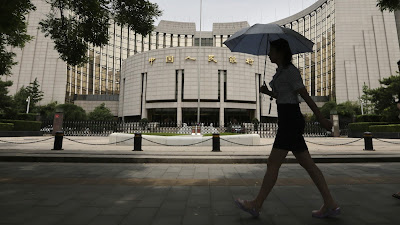Chinese Financial Regulation: The Need for a Single Regulator to Guard Against ‘Financial Crocodiles’ and ‘Poisonous Demons’
This short post looks to understand
the current financial regulatory environment within China, because there is a
growing debate as to whether the decentralised and fragmented framework that
currently exists is capable of protecting the world’s second-largest, yet
arguably fragile
economy. The overriding call is to create a ‘super-regulator’ who would oversee
all the major elements of the Chinese economy; this is something worth
considering, but the recent calls for the People’s
Bank of China (PBOC) to take the lead may not be as optimal as it seems.
This post, therefore, analyses the problems facing the Chinese economy, and why
it has them, and ultimately suggests that a centralised financial regulator
would be the best option, but that there must be conditions attached to make it
effective.
Currently, within China, the PBOC
has a broad remit over the macro elements of the Chinese economy, but the
detailed elements of overseeing aspects such as banking, securities, and
insurance, are overseen by three different regulatory agencies (stemming from
moves between 1998 and 2003 to respond
to the increasing complexity of financial products and services). However,
in response to the ever-changing financial world, and how that may affect
China, there has been an increasing
chorus of calls to give more defined power to the central bank. These calls
are based upon understandings that each of these sub-elements of the regulatory
framework are facing extraordinary pressure from having to regulate unscrupulous
actors. The Chairman of the China Insurance Regulatory Commission stated that
insurers engaged in speculation would face severe punishments, ultimately
referring to those who operate outside of the welfare-creating mandates as ‘barbarians’.
The Chairman of the China Securities Regulatory Commission, Lui Shiyu,
described tycoons who unfairly profit from the stock markets as ‘financial
crocodiles’ and vowed to stop them sucking the ‘blood of the retail
investors’. The Chairman of the CSRC continued this colourful attack,
describing some private companies who seek to work around the rules as ‘poisonous
demons’. The reason for this influx is China’s moves to fend off the negative
effects of the Financial Crisis, which saw it incorporate an ‘era
of financial liberalisation’, represented by a massive financial stimulus,
an increase in the acceptance of novel and exotic financial products, and a
general lowering of regulatory oversight in the name of encouraging growth –
the result was obvious, with the collapse
of China’s Stock market in 2015 being rather inevitable.
So, in response to the general
increase in systemic risk within China, President Xi Jinping has made reducing
this risk a key
objective for 2017. This narrative is gathering pace, with the Governor of
the PBOC stating that ‘regulators
need to step up their coordination in scrutinising such products’, which
was further
consolidated by the leadership of the country. The increase in ‘shadow
banking-based lending’, which is notoriously under-regulated, is proving to
be a major concern for regulatory officials, and is beginning to prompt the
practical realisation of the aforementioned narrative, with the leaders of each
of the three regulatory agencies calling for ‘greater
cooperation’. This seems to allude to one understanding, because the
Governor of the PBOC is more interested in promoting the narrative that the
three regulators must do more, rather than depriving them of the ability to
regulate and transferring that power to the central bank – the only outcome,
therefore, is what is being dubbed a ‘super-regulator’.
This coalescing of the three regulators would provide a unified face to the ‘crocodiles’,
which can only be a good thing, in theory.
However, that theory may not
necessarily translate into practice. The SEC, which is responsible for large
swathes of the American Economy, is consistently
being criticised for a number of issues, ranging from a lack of meaningful
powers to the blight of the ‘revolving door’. The centralised Financial
Services Authority, the regulator in charge of the U.K.’s economy in the lead
up to the Crisis, was disbanded
and divided in the wake of the Crisis, mostly on the understanding that a
centralised regulator was not appropriate for the British market. So, there is
no guarantee that a centralised, all-encompassing financial regulator would be
suitable for the Chinese market, particularly when we understanding the incredible
pressures facing such a massive and expanding economy such as China’s.
Ultimately, if the leadership of
China introduces such a regulator, then it must be accompanied by substantial
powers. This narrative being developed by the leaders of the regulator
agencies, that the offenders are ‘crocodiles’, ‘barbarians’, and ‘poisonous
demons’, should translate into extensive powers to punish and make an example
out of those who seek to plunder markets and leave without consequence. On the
one hand, the single-party nature of Chinese politics makes this outcome
likely, because there are not competing economic ideologies at play within the
politburo (not on the surface anyway). But, on the other hand, the need to
continually expand and develop the Chinese economy exposes the Chinese society
to the iniquities of the marketplace which are a blight on Western Societies –
the need for Britain to ‘grow’ in the wake of its secession from the E.U., the
need for the E.U. to ‘grow’ without the power of the City of London, and the
need for the U.S. to ‘grow’ on the back of its voting for protectionism, leaves
all of these globally-vital societies at the mercy of the venal. Finding that
balance between the need to grow and the need to protect for the future is the
defining dichotomy of our time.





Comments
Post a Comment